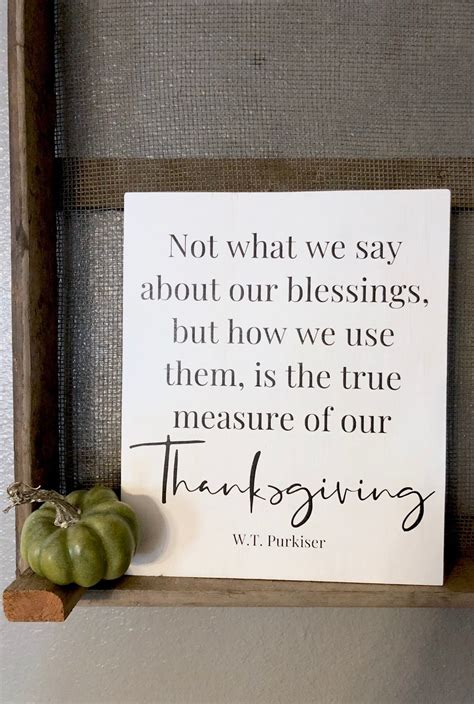Ein Zitat von WT Purkiser
Nicht das, was wir über unsere Segnungen sagen, sondern die Art und Weise, wie wir sie nutzen, ist der wahre Maßstab unserer Dankbarkeit.“ Und die Worte von John Fitzgerald Kennedy sagen uns: „Wenn wir unsere Dankbarkeit ausdrücken, dürfen wir nie vergessen, dass die höchste Wertschätzung ist.“ nicht um Worte auszusprechen, sondern um nach ihnen zu leben.
Verwandte Zitate
Es gibt eine Tradition in Amerika, auf die ich stolz bin. Es ist unsere erste Freiheit und der wahrste Ausdruck unseres Amerikanismus: die Fähigkeit, ohne Angst anderer Meinung zu sein. Es ist unser Recht, die Worte „Ich bin anderer Meinung“ auszusprechen. Wir müssen uns frei fühlen, diese Worte an unsere Nachbarn, unseren Klerus, unsere Pädagogen, unsere Nachrichtenmedien, unsere Gesetzgeber und vor allem an denjenigen unter uns zu richten, den wir wählen – den Präsidenten.
Was ist Leben? Gedanken und Gefühle entstehen, mit oder ohne unseren Willen, und wir verwenden Worte, um sie auszudrücken. Wir werden geboren, und an unsere Geburt erinnert man sich nicht, und an unsere Kindheit erinnert man sich nur in Fragmenten. Wir leben weiter, und indem wir leben, verlieren wir die Vorstellung vom Leben. Wie vergeblich ist es zu glauben, dass Worte das Geheimnis unseres Seins durchdringen können. Wenn sie richtig eingesetzt werden, können sie unsere Unwissenheit über uns selbst deutlich machen, und das ist viel.
Geld ist eine Antwort. Wir nutzen es, um unsere sozialen Werte, unsere Dankbarkeit, unsere Wertschätzung, unsere Freude und unsere Unterstützung auszudrücken. Geld gibt uns die Fähigkeit zu reagieren (Reaktionsfähigkeit), und sein bestärkender Einsatz definiert oft die wirklich Verantwortlichen unter uns.
Ich glaube, dass Worte uns helfen können, uns zu bewegen oder uns paralysieren zu lassen, und dass unsere Wahl der Sprache und des verbalen Tons etwas – und zwar sehr viel – damit zu tun hat, wie wir unser Leben leben und mit wem wir letztendlich sprechen und hören; und dass wir Worte natürlich durch Trivialisierung, aber auch durch ritualisierten Respekt ablenken können, oder wir können sie in unsere Seelen eindringen lassen und sie mit den Säften unseres Geistes vermischen.
Ein Gebetsleben ist der Schlüssel zur Dankbarkeit. Die Menschen, denen unsere Dankbarkeit am meisten gebührt, halten wir oft für selbstverständlich. Warten wir nicht, bis es zu spät ist, unsere Dankbarkeit auszudrücken. Dankbarkeit zu empfinden und sie nicht auszudrücken, ist so, als würde man ein Geschenk einpacken und es nicht weitergeben. Wenn ich die Dankbarkeit zu den schweren Sünden zähle, dann gehört die Dankbarkeit zu den edelsten Tugenden. Dankbarkeit auszudrücken ist gnädig und ehrenhaft, Dankbarkeit zu zeigen ist großzügig und edel, aber immer mit Dankbarkeit im Herzen zu leben bedeutet, den Himmel zu berühren.
Im Leben ist es für uns so einfach, Segnungen zu empfangen, von denen viele fast ungezählt sind, und Dinge in unserem Leben geschehen zu lassen, die dazu beitragen können, unser Leben zu verändern, zu verbessern und den Heiligen Geist in unser Leben zu bringen. Aber manchmal halten wir sie für selbstverständlich. Wie dankbar sollten wir für die Segnungen sein, die das Evangelium Jesu Christi in unsere Herzen und Seelen bringt. Ich möchte Sie alle daran erinnern, dass wir, wenn wir unserem himmlischen Vater jemals die richtige Dankbarkeit zeigen wollen, dies mit ganzem Herzen, ganzer Kraft, ganzem Verstand und ganzer Kraft tun sollten – denn er war es, der uns Leben und Atem schenkte
Wenn wir das, was über unsere Lippen kommt, nicht zurückhalten oder Grenzen setzen können, haben unsere Worte das Sagen – nicht wir. Aber wir sind immer noch für diese Worte verantwortlich. Unsere Worte kommen nicht von irgendwo außerhalb von uns, als wären wir die Puppe eines Bauchredners. Sie sind das Produkt unserer Herzen. Unser Sprichwort „Das habe ich nicht so gemeint“ lässt sich wahrscheinlich besser mit „Ich wollte nicht, dass du weißt, dass ich das über dich gedacht habe“ übersetzen. Wir müssen Verantwortung für unsere Worte übernehmen. „Aber ich sage euch, dass die Menschen am Tag des Gerichts Rechenschaft ablegen müssen für jedes unvorsichtige Wort, das sie geredet haben“ (Mt 12,36).
Nichts inspiriert und ermutigt Menschen so sehr wie anerkennende Worte. Sie und ich mögen die Worte der Ermutigung und Wertschätzung, die wir jetzt äußern, bald verfälschen, aber die Person, mit der wir sie gesprochen haben, wird sie vielleicht ein Leben lang schätzen und für sich selbst wiederholen
Ein dankbares Herz entsteht dann, wenn wir unserem himmlischen Vater für seine Segnungen und den Menschen um uns herum für alles danken, was sie in unser Leben bringen. Dies erfordert bewusste Anstrengung – zumindest bis wir wirklich eine Haltung der Dankbarkeit gelernt und kultiviert haben. Oft sind wir dankbar und wollen unseren Dank aussprechen, vergessen es aber oder kommen einfach nicht dazu. Jemand hat gesagt: „Dankbarkeit zu empfinden und sie nicht auszudrücken, ist so, als würde man ein Geschenk einpacken und es nicht weitergeben.“
Eines der Hauptsymptome der allgemeinen Krise unserer heutigen Welt ist unsere mangelnde Sensibilität für Worte. Wir nutzen Wörter als Werkzeuge. Wir vergessen, dass Worte ein Aufbewahrungsort des Geistes sind. Die Tragödie unserer Zeit besteht darin, dass die Gefäße des Geistes zerbrochen sind. Wir können uns dem Geist nicht nähern, ohne die Gefäße zu reparieren. Ehrfurcht vor Worten – ein Bewusstsein für das Wunder der Worte, für das Geheimnis der Worte – ist eine wesentliche Voraussetzung für das Gebet. Durch das Wort Gottes wurde die Welt geschaffen.
Denn wir ließen unsere jungen Männer und Frauen unbewaffnet ausgehen, in einer Zeit, in der Rüstungen noch nie so notwendig waren. Indem wir ihnen das Lesen beibrachten, haben wir sie dem gedruckten Wort ausgeliefert. Durch die Erfindung des Films und des Radios haben wir dafür gesorgt, dass keine Abneigung gegen das Lesen sie vor der unaufhörlichen Flut von Wörtern, Wörtern, Wörtern schützt. Sie wissen nicht, was die Worte bedeuten; sie wissen nicht, wie sie sie abwehren, ihre Schärfe abstumpfen oder sie zurückschleudern können; Sie sind in ihren Gefühlen den Worten zum Opfer, anstatt sie in ihrem Intellekt zu beherrschen.

































